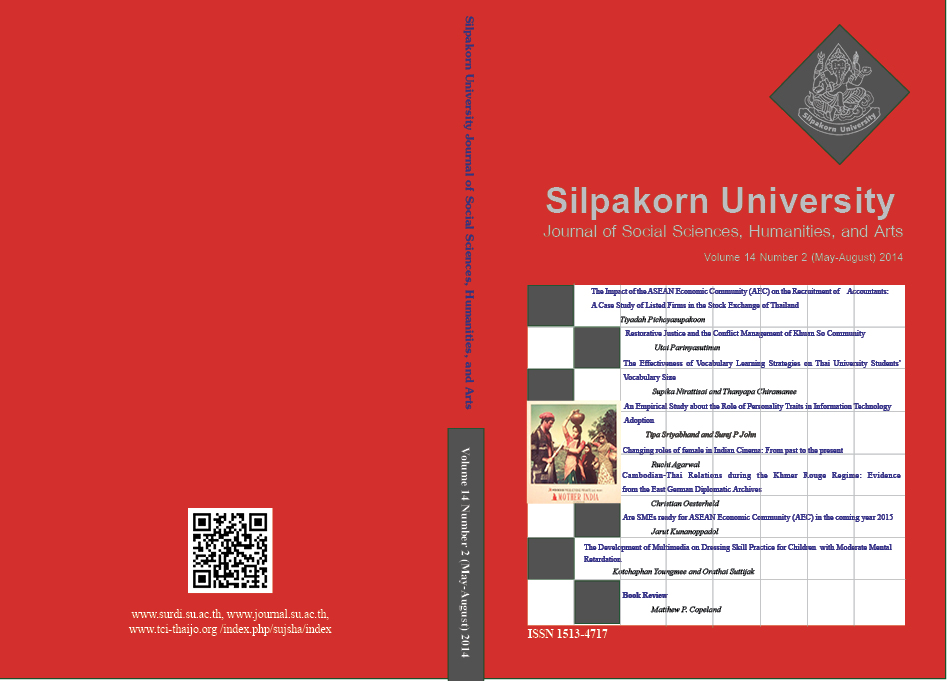Cambodian-Thai Relations during the Khmer Rouge Regime: Evidence from the East German Diplomatic Archives
Main Article Content
Abstract
Unsurprisingly, the scholarly literature on Democratic Kampuchea focuses on the Khmer Rouge’s internal policies, notably aspects of their ideology and regime of terror. By and large, Democratic Kampuchea is seen as a hermetically sealed hermit state with little engagement in foreign relations. If indeed foreign policy is scrutinized, most accounts are limited to a discussion of the Khmer Rouge’s relations to China and the Cambodian-Vietnamese war of the late 1970s. The similarly troublesome, if non-escalating relationship between DemocraticKampuchea and Thailand during the Khmer Rouge’s time in power is rarely touched upon in the scholarly literature on Cambodia.
Based on an analysis of primary sources from the East German diplomatic archives, this paper aims to help filling this historiographical gap by providing an account on Thai-Cambodian relations during the period of Democratic Kampuchea (1975-1979), framed by a discussion of some basic principles of Khmer Rouge foreign policy.
Downloads
Article Details
All rights reserved. Apart from citations for the purposes of research, private study, or criticism and review,no part of this publication may be reproduced, stored or transmitted in any other form without prior written permission by the publisher.
References
Caswell, Michelle. (2010) Khmer Rouge Archives: Accountability, Truth, and Memory in Cambodia. Archival Science 10(1): 25-44.
Chandler, David P. (1999) Voices from S-21: Terror and History in Pol Pot’s Secret Prison. Berkeley, Los Angeles & London: University of California Press.
Chigas, George. (2000) Building a Case Against the Khmer Rouge: Evidence from the Tuol Sleng and Santebal Archives. Harvard Asia Quarterly 4(1).
Ciorciari, John D. (2001) Evidence in the Prospective Trials of Former Khmer Rouge Officials. Searching for the Truth, 16: 32-34; 17: 30-32; 18: 23-26; 19: 31-33; 20: 33-34; 21: 24-26; 22: 29-32; 23: 34-37; and 24: 30-32.
Clymer, Kenton J. (2004) The United States and Cambodia, 1969-2000: A Troubled Relationship. London and New York: RoutledgeCurzon.
Elena, Torou, Akrivi Katifori, Costas Vassilakis, et al. (2010) Historical Research in Archives: User Methodology and Supporting Tools. International Journal on Digital Libraries 11(1): 25-36.
Heder, Stephen R. (2001) Documentary Evidence Linking Surviving Leaders of the Communist Party of Kampuchea to Crimes Agaisnt Humanity in Cambodia, 1975-1979: An Additional Preliminary Sampling from the Holdings of the Documentation Center of Cambodia. Searching for the Truth, 14: 33-36 and 15: 28-30.
Jackson, Karl D. (1978) Cambodia 1977: Gone to Pot. Asian Survey 18(1): 76-90.
Johansen, Raymund. (2000) War Crimes and the Cambodian Genocide. Searching for the Truth 3: 27-29.
Kiernan, Ben. (1996) The Pol Pot Regime: Race, Power, and Genocide in Cambodia under the Khmer Rouge, 1975-1979. New Haven, Conneticut: Yale University Press.
Kiernan, Ben. (2001) Myth, Nationalism and Genocide. Journal of Genocide Research, 3(2): 187-206.
Ly Sophal. (2001) Research via a Photo of Prum Ky. Searching for the Truth 19: 22-24.
Morris, Stephen J. (1999) Why Vietnam Invaded Cambodia: Political Culture and the Causes of War. Stanford, CA: Stanford University Press.
Mosyakov, Dmitry. (2005) The Khmer Rouge and the Vietnamese Communists: A History of Their Relations as Told in the Soviet Archives. In Genocide in Cambodia and Rwanda: New Perspectives (Susan E. Cook, ed.), pp. 45-77. New Brunswick, NJ: Transaction Publishers.
Ponchaud, François. (1977) Cambodge: Deux ans après la liberation. Revue d’études comparatives Est-Ouest 8(4): 143-56.
Poole, Peter A. (1976) Cambodia 1975: The GRUNK Regime. Asian Survey 16(1): 23-30.
Pradhan, P. C. (1985) Foreign Policy of Kampuchea. New Delhi: Radiant Publishers.
Quinn, Kenneth M. (1977) Cambodia 1976: Internal Consolidation and External Expansion. Asian Survey 17(1): 43-54.
Ragos-Espinas, M. (1983) Democratic Kampuchea 1975-1978. Quezon City: Asian Center, University of the Philippines.
Rungswasdisab, Puangthong. (2005) Thailand’s Response to the Cambodian Genocide. In Genocide in Cambodia and Rwanda: New Perspectives (Susan E. Cook, ed.), pp. 79-126. New Brunswick, NJ: Transaction Publishers.
Sin, Sothida. (2009) Lim Ly, Economic Support Unit Chief in North-Western Division 2. Searching for the Truth, II/2009: 6-8.
Vitalis, Robert. (2006) The Past Is Another Country. In A Handbook for Social Science Field Research: Essays & Bibliographic Sources on Research Design and Methods (Ellen Perecman and Sara R. Curran, eds.), pp. 5-17. Thousand Oaks etc.: Sage Publications.
Weggel, Oskar. (1977) Kambodscha 1975/76. Hamburg: Institut für Asienkunde.


